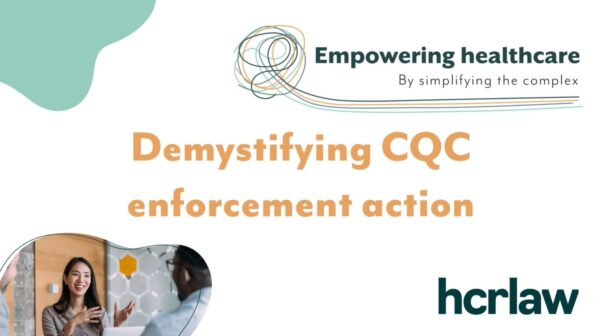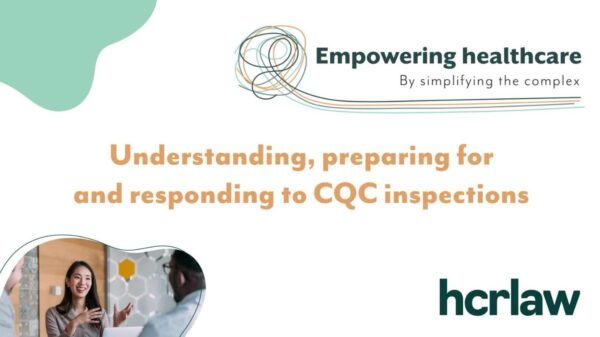

With the new financial year comes the annual increase in National Minimum Wage rates and the introduction of new legislation.
For healthcare providers, this year’s National Minimum Wage (“NMW”) increase is coupled with the changes to national insurance contribution (“NIC”) wage thresholds, meaning the cost of employment continues to rise. For many, this is a particular pinch point, given the ongoing struggles faced by stagnant local authority funding rates for care in some areas.
National Minimum Wage increase
Despite the efforts of social care providers to seek an exemption from the NIC increases, the exemption approved by the House of Lords in late February 2025 was overturned in the House of Commons vote on 19 March 2025, meaning care providers must prepare for the financial impact of the combined costs.
The new rates of National Minimum Wage from 1 April 2025 are:
- 21 and over (National Living Wage (“NLW”): £12.21 (6.7% increase)
- 18 – 20-year-olds: £10.00 (16.3 % increase)
- 16 – 17-year-olds: £7.55 (18% increase)
- Apprentices: £7.55 (18% increase)
These increases will raise the wages of about 150,000 independent sector care workers. An estimated 18% of the 875,000 independent sector care workers in England earned the NLW in 2024 (source: Skills for Care). The growing wage bills for many providers will be reaching a crunch point, with a significant uplift in overheads, costs and expenses.
Increases in NMW require corresponding changes in all levels of staff remuneration to recognise skills, experience and seniority. Alongside the increases in NIC for employers, set out below, operational costs for care providers have now increased significantly.
For those providers who are heavily reliant on publicly funded care, the impact is particularly significant. Numerous local authorities have proposed below inflationary annual increases on care home fees, some as low as 1.4%. This is wholly inadequate to provide good quality care and, indeed for providers to achieve and maintain financially viable services.
What can health and social care providers do about employment changes?
Local authorities are required to assess the needs of everyone in their area. For those whose needs are eligible for support, the local authority must then provide or commission services to meet those needs in terms of sections 13 and 18 Care Act 2014. Arguably these below inflation increases are a derogation of that duty.
Providers are being forced to consider different legal avenues to challenge this, including judicial review. Judicial review however is a lengthy and expensive process and can’t force a local authority to increase fees. It can only, if successful, force the local authority to look at the legality of its decision making around uplifts.
It may be more successful to use your contractual terms to challenge the situation. The statutory imposition by government of these increased costs, which employers/ providers have no control over, could amount to a material change of circumstances. Commercial contracts usually contain a provision for adjustment if there is a material change of circumstance.
Providers should therefore:
- Check contracts to see if such provision exists, looking particularly carefully at dispute resolution clauses
- Use these provisions to force price adjustments
- Argue that such terms should be implied as necessary to make long-term contracts commercially viable.
The issues for debate will be whether such cost increases should be passed to the commissioner or shared.
National Insurance Contribution increases
It’s now confirmed that social care providers will not be exempt from the rise in National Insurance contributions which were applied from April 2025. The employer rate now stands at 15% (from 13.8%) and the salary threshold at which employers start paying the tax has dropped to £5,000 a year, from £9,100. Estimates suggest this will add an additional £940 million in costs for independent care providers.
What are the implications for healthcare providers?
Ultimately, if the various cost pressures reach the point where a provider can’t pay its debts when they fall due, it may be left with no option but to enter an insolvency process.
It’s vital to take early advice to establish whether there are alternative options that can be explored to avoid this, for example seeking investment or refinancing, considering a possible restructure of the business or even a sale. The longer it’s left, the less options will be available to providers.
It is also important for management to take advice to ensure they are complying with their statutory duties so that they are protected from personal liability if the business does ultimately enter an insolvency process.
If providers feel forced into reductions in staffing ratios or short staffing during absences because of cost pressures, service levels will inevitably decrease which could result in mistakes, or spiral into errors in care provision leading to CQC breaches.
Staff may leave to take jobs with higher paying providers or seek employment outside of the industry. This creates a widening skills gap at time when projections show a growing need for care services due to an aging population with increasingly complex care needs.
How can providers prepare?
Whilst healthcare providers can’t escape these increases, considering cost savings in other areas may offer some opportunity to alleviate and offset overall business costs.
Caution should be taken if you’re considering wholesale changes to terms and conditions of employment, as these may trigger consultation obligations. Likewise, providers shouldn’t rush into changing the way they engage their workers without detailed consideration of both employment status and tax risks.
Staying on top of financial information is critical. Make sure you understand your cash flow and balance sheet (ideally for 13 weeks in advance) so you can clearly see where a problem may be coming down the line.
Consider any refinancing options and whether you can agree payment plans/ extend payment terms. Be proactive with chasing debts and consider engaging a debt recovery team which could produce better results.
If in any doubt, seek specialist advice regarding the financial position of the business and the options available to you.
How can we help you?
"*" indicates required fields










